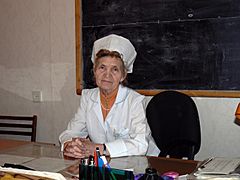Taisiya Sergeevna Osintseva facts for kids
Quick facts for kids
Taisiya Sergeevna Osintseva
|
|
|---|---|

Prof. T.S. Osintseva
|
|
| Born | October 9, 1923 |
| Died | November 17, 2008 |
| Nationality | Russia |
| Alma mater | Izhevsk State Medical Institute |
| Known for | chronic neuroinfections (Tick-borne encephalitis, Lyme disease) |
| Awards | Order of the Badge of Honor, Medal "The Veteran of Labor", Medal "For the Valorous Labor. In commemoration of Centenary of V.I. Lenin's birth" |
| Scientific career | |
| Fields | neurology |
| Institutions | Izhevsk State Medical Academy (1949–2008) |
| Doctoral advisor | E.M. Vizen |
| Signature | |
 |
|
Taisiya Sergeevna Osintseva (October 9, 1923 – November 17, 2008) was a famous Russian Professor of Neurology. She was known as an Honored Scientist of Russia and an Honorary Professor of the Izhevsk State Medical Academy. She made important discoveries about brain infections.
Contents
About Taisiya Osintseva
Early Life and Education
Taisiya Osintseva was born in Izhevsk, Russia, on October 9, 1923. She grew up in a big family. Her father, Sergey Ivanovich, worked in a factory, and her mother, Olga Vasilyevna, was a homemaker.
She studied medicine at the Izhevsk State Medical Institute and graduated in 1946. After that, she spent three more years studying neurology in a special training program called a residency. This training helped her become an expert in brain and nerve problems.
In 1958, she earned her first advanced degree, like a PhD, in medical science. Her research was about how to check for nerve problems in soldiers. Later, in 1969, she earned her highest degree in medical science. This time, her research focused on long-lasting brain infections that could cause epilepsy.
Her Work and Career
After finishing her training, Dr. Osintseva became a leader in the Neurology Department. She managed medical wards and taught students about neurology. From 1960 to 1990, she was the head of the Neurology Department at the Izhevsk State Medical Institute.
Dr. Osintseva was very active in improving medical education. In 1969, she helped open the first medical genetic clinic in Udmurtia. This clinic helped people understand how genes can affect health. She also made sure that students learned about medical genetics. In 1976, she supported starting a course in neurosurgery, which is brain surgery.
During her time as head of the department, she guided many students. Three of her students earned the highest medical science degree, and seven others earned the first advanced degree. Even after 1990, until her last day, she continued to work as a professor. She taught classes and gave lectures to medical students, new doctors, and experienced physicians.
Her Scientific Discoveries
Dr. Osintseva was very interested in studying serious infections that affect the nervous system. These included tick-borne encephalitis (also known as Russian spring-summer encephalitis) and Lyme disease. These diseases are spread by ticks and can cause serious brain problems.
She wrote almost 160 articles about her research. She also co-wrote an important book called "Tick-Borne Encephalitis: A Clinical Guide for Practicing Physicians and Medical Students" in 1976. This book helped other doctors understand and treat tick-borne encephalitis.
Public Service and Recognition
Besides her work at the university, Dr. Osintseva was also involved in public service. She led the Udmurt Branch of the Russian Scientific Society of Neurologists and Psychiatrists. She also served as the main Neurologist for the Udmurt Ministry of Health from 1960 to 1990.
For her hard work and contributions, she received several awards:
- The Order of the Badge of Honor
- The Medal "Veteran of Labour"
- The Jubilee Medal "In Commemoration of the 100th Anniversary since the Birth of Vladimir Il'ich Lenin"
- She was named an Honored Scientist of the USSR in 1986.
- She was also an Honorary Professor of the Izhevsk State Medical Academy.
Later Years
Professor Osintseva passed away on November 17, 2008, at the age of 85. She was buried at the Nagorny Cemetery in Izhevsk, Russia. Her work greatly helped our understanding of brain infections and improved medical education.
Images for kids
 | Tommie Smith |
 | Simone Manuel |
 | Shani Davis |
 | Simone Biles |
 | Alice Coachman |


